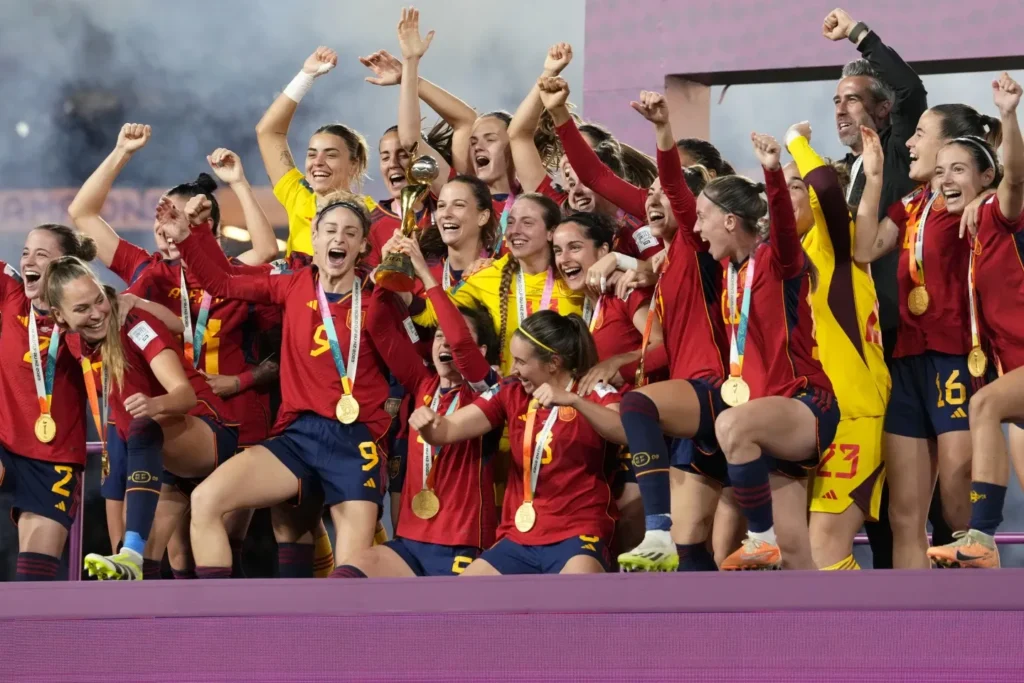The Ambitious Path to Paris
Coach Montse Tomé’s recent declaration about Spain’s women’s soccer team highlights a formidable goal as they approach the Paris Olympics. Tomé’s assertion of the team’s “insatiable ambition” underscores the relentless drive that characterizes the squad’s quest for gold. This mentality has fueled the team’s remarkable journey, from World Cup champions to Olympic hopefuls.
In this detailed exploration, we will dive into the team’s preparation, past challenges, key players, and the broader landscape of the women’s soccer tournament in Paris. We aim to provide a comprehensive look at how Spain’s footballers are gearing up for another prestigious competition and the intricacies involved in their pursuit of Olympic success.
The Journey from World Cup to Olympics
Spain’s World Cup Victory
Spain’s women’s team achieved a historic milestone by winning the Women’s World Cup. The victory was a testament to their skill and resilience, with standout performances from top players such as Aitana Bonmatí, the reigning Ballon d’Or winner, and Alexia Putellas, a two-time former Ballon d’Or recipient. Despite the internal turmoil and controversies leading up to the tournament, the team’s perseverance on the field was commendable.
Prior to the World Cup in Australia and New Zealand, Spain faced significant challenges. A considerable number of players had withdrawn from the national team, citing poor treatment and disagreements with the coaching staff. The situation was exacerbated by the controversy surrounding then-coach Jorge Vilda and the Spanish federation’s president, Luis Rubiales, whose actions during the trophy ceremony led to widespread outrage and his eventual resignation.
Leadership Changes and New Beginnings
Following the World Cup, Spain saw significant changes in their coaching staff. Vilda was dismissed, and Montse Tomé, a former national team player, was appointed as the new head coach. Under Tomé’s leadership, the team has embraced a fresh start, focusing on their upcoming Olympic campaign with renewed vigor. Spain’s successful qualification for the Olympics, achieved through their triumph in the UEFA Nations League, reflects the team’s ongoing commitment to excellence.
The Olympics: A New Challenge
Spain is set to open their Olympic campaign against Japan in Nantes. This match, part of Group C, also includes formidable teams like Brazil and Nigeria. Brazil’s participation is particularly noteworthy as it features the legendary Marta, who is competing in her final major tournament. Despite her extensive career, Marta has yet to secure a World Cup trophy or an Olympic gold medal, making this tournament a significant one for her.
The Competitive Landscape of Women’s Soccer in Paris
Group Dynamics and Key Matches
The women’s soccer tournament in Paris features 12 teams spread across various stadiums in France. The host nation, France, will kick off Group A play against Colombia in Lyon, with the exciting teenage talent Linda Caicedo representing the Colombian side. Group A also includes Canada and New Zealand, who will face off in Saint-Etienne. Canada, the defending gold medalists, has been embroiled in controversy due to a drone incident involving a nonaccredited staff member. This issue has led to the dismissal of two Canadian staff members and a voluntary withdrawal of coach Bev Priestman from the team’s opener, emphasizing the importance of sportsmanship and integrity.
The United States and Other Contenders
In Group B, the United States is determined to recover from their disappointing World Cup performance. Under the guidance of Emma Hayes, the former Chelsea coach, the U.S. team will open their campaign against Zambia in Nice. The group also features Germany and Australia, with Germany’s midfielder Lena Oberdorf and American forward Catarina Macario both sidelined due to injuries. Australia will notably miss star player Sam Kerr, who is recovering from an ACL injury. New Zealand’s captain, Ali Riley, is also out due to injury, with Michaela Foster stepping in as her replacement.
Expectations and Realities
Emma Hayes, who joined the U.S. team just before the Women’s Super League season concluded, has tempered expectations. She emphasizes the balanced nature of the tournament and the need for respect toward all competing teams. Hayes’ approach reflects a broader recognition that the women’s game has evolved, and traditional assumptions about certainty in outcomes must be reassessed.
The Broader Context of Women’s Soccer
Evolving Standards and Competitive Balance
The women’s soccer landscape has undergone significant changes in recent years. The level of competition has intensified, with more teams capable of challenging traditional powerhouses. This evolution is evident in the diverse array of teams vying for medals in Paris. The increased parity and the rise of emerging footballing nations underscore the dynamic nature of the sport.
The Role of Leadership and Integrity
Leadership and integrity remain crucial in maintaining the sport’s reputation and ensuring fair play. The recent controversies involving various teams highlight the importance of ethical conduct and transparency. As teams like Spain, Canada, and the United States navigate these challenges, their actions on and off the field will shape the narrative of the tournament.
Conclusion
As Spain’s women’s soccer team embarks on their Olympic journey, the blend of ambition, talent, and resilience will be pivotal in their quest for gold. The Paris Olympics promise to be a showcase of exceptional footballing talent and an opportunity for teams to demonstrate their growth and adaptability. Spain, with its refreshed leadership and a talented roster, is poised to make a significant impact. The tournament will not only highlight the team’s ability to overcome past challenges but also their readiness to seize new opportunities on the global stage.
For more detailed coverage and updates on the exciting world of soccer, visit our Soccer Category.


